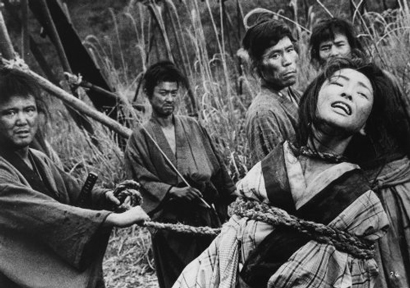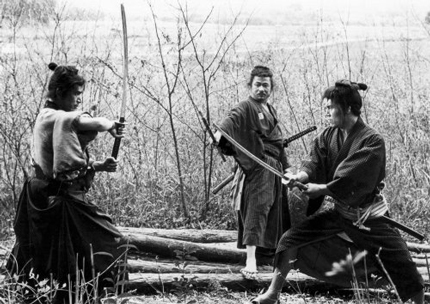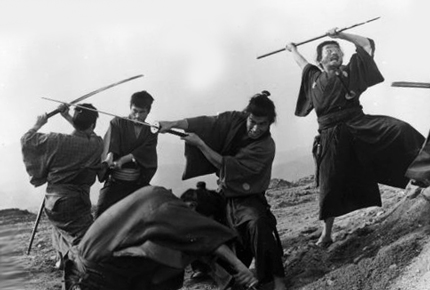
 |
|
|
|
In 1964 Japan was awash in a new wave of exciting samurai films. In the wake of Akira Kurosawa's popular Yojimbo more Japanese action films were exported overseas, especially to Europe, where the exciting chambara swordfighting genre offered an exotic alternative to already popular American westerns. With such a glut of product hitting Japanese theaters each week, it may not have seemed a good time for a new director to make his mark. But Hideo Gosha's unusual career conformed to few rules. Gosha transitioned from television by adapting his own popular samurai series about a trio of swordsmen that band together to fight injustice on a weekly basis. 
Three Outlaw Samurai (Sanbiki no samurai) does not play like an expanded television episode; it's an impressively well-told story with interesting characters and a surprise in every scene. Gosha and his writers Keiichi Abe and Eizaburo Shiba work clever games with the standard samurai archetypes: all are present, yet they refuse to accept their traditional roles. Three Outlaw Samurai quickly lets us know that it is not going to be yet another simplistic morality play about honor and loyalty. Wandering samurai swordsman Sakon Shiba (Tetsuro Tanba) comes across three ragged farmers who have abducted Aya (Miyuki Kuwano), the daughter of the local magistrate. Though the clumsy farmers threaten him, Shiba does not interfere after learning that the kidnappers are hoping to force the magistrate to recognize their land and tax reforms. But Aya's father is concerned only about his image with his superiors. Ordering his men to kill the farmers and rescue his daughter, he frees Kyojuro Sakura (Isamu Nagato) from his prison to accompany them. But the farmers impress Sakura as well. He immediately changes sides and joins Shiba in defense of the tiny mill where Aya is being held. Furious that his authority has been undermined, the magistrate agrees to spare the farmers and hear their protest after they let Aya go free. Shiba and Sakura demand that the magistrate put his oath as a samurai behind his promise. One of the magistrate's retainers is the calculating, cynical Einosuke Kikyo (Mikijiro Hira). Kikyo refuses to get involved in a squabble with peasants, but he also realizes that the thoroughly despicable magistrate has no intention of honoring his oath. Back in her father's castle but not happy, Aya reconsiders everything she has seen and heard. She switches her loyalty to the protesters as well. An action film energized by a strong dose of social comment, Three Outlaw Samurai maintains strong story values throughout. Sakon Shiba intrigues us with his unexpected backing of the crude kidnappers. The moral position of the pragmatic Kyjuro Sakura is even more interesting. Although he changes sides without batting an eye, Sakura doesn't seem a turncoat, and is the most dependable of the three samurai heroes. He falls in love with the widow of a peasant he has killed, and must think of a way to break the news to her. If Sakura and Shiba's heroism is unlikely, the friendless loner Einosuke Kikyo initially seems incapable of a noble deed. Refusing to fight beneath his station, the professional retainer expresses contempt for everything around him, including his pompous employer. 
Hideo Gosha's engaging filmmaking style never leaves us impatient for the next action scene; indeed, the first couple of skirmishes involve little more than some sloppy pushing and shoving. As 1964 was too early for the formalistic beauties of Italian westerns to influence the samurai film, Gosha's visuals remain keyed to the emotional pitch of scenes. Although the action is dynamic, the movie does not dote on mytho-poetic images. The fights are up-close and rough. Until the larger free-for-alls in the third act, they convince as messy and desperate swordplay, not slick action choreography. We're actually more concerned with how Aya will react, or how her father will deal with the visit of the local lord, than with the fights themselves. Sergio Leone betrayed his status as a fan of Yojimbo when his phenomenally successful A Fistful of Dollars turned out to be a scene-for-scene plagiarism of Kurosawa's film. Interestingly, the character schematic of Three Outlaw Samurai bears a structural resemblance to Leone's later The Good, The Bad and The Ugly. One fighter is an enigmatic loner, another more vulgar and sentimental, and the third an unsympathetic soldier of fortune. The working title for The Good, The Bad and The Ugly , when only two characters were to be emphasized, was Due magnifici straccioni, or "Two Magnificent Scoundrels". What separates Gosha from Leone is more than style: the Japanese filmmaker makes Three Outlaw Samurai a thorough critique of authoritarian society and the traditional honor code of the samurai. In Gosha's view the oppressive forces are money, power and class. The magistrate subscribes to no code except his own convenience and prestige. The only honor to be found in is therefore the opposition of unjust authority. But even though our heroes' formation of a united fighting front wins our approval, the weight of the status quo is too great. The protesting peasants are too easily eliminated. Those that remain are too terrorized to press their reforms, even when the opportunity finally materializes. The sacrifice of their comrades only fills them with defeat. Realizing that he will now be a hunted outlaw, Sakura must rethink the widow's offer of a settled life. And Einoskuke will no longer qualify for an easy assignment as an official retainer. The three fighters leave in search of more adventures, but no sequels would follow. Hideo Gosha proceeded to the samurai classics Sword of the Beast and Goyokin. 
Already a star, Tetsuro Tanba was a producer on Three Outlaw Samurai and became one of the wealthiest actors in Japan. Although dubbed badly into English, he also saw international exposure as Tiger Tanaka in the fifth James Bond spectacle, You Only Live Twice. The Criterion Collection's Blu-ray of Three Outlaw Samurai contains a beautiful B&W transfer of this Shochiku gem. The soundtrack is particularly well recorded, with special emphasis given to muddy footsteps and sharp music cues. Asking a lower price point, Criterion goes lean on the extras. An original trailer is included, along with a slim booklet containing an informative essay on the film and its director by Bilge Ebiri. Criterion's disc producer is Jason Altman.
On a scale of Excellent, Good, Fair, and Poor,
Three Outlaw Samurai Blu-ray rates:
Reviews on the Savant main site have additional credits information and are often updated and annotated with reader input and graphics. Also, don't forget the 2011 Savant Wish List. T'was Ever Thus.
Review Staff | About DVD Talk | Newsletter Subscribe | Join DVD Talk Forum |
| ||||||||||||||||||